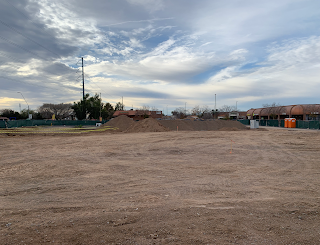How ordinary people talked in old-time Phoenix - 1990s-1970s
Since I love to imagine myself in old-time Phoenix, I often wonder what ordinary people talked like. That is, what slang terms did they use? What words would have caused me to get a punch in the nose? What words would have made absolutely no sense to people "back in the day"? Today I'm going to time-travel back to the '90s and '70s to explore how ordinary people talked.
• The 1990s. It doesn't really feel that long ago to me, but times have changed. You certainly wouldn't have heard people saying that they were going to Google something, and while the software Photoshop existed, there would have been no understanding of "Photoshopping" something (unless you were talking to a Graphic Designer, like me). And in 1999 I bought a car that had a name that would cause people to laugh nowadays, it was called a "Cougar". Nowadays a Cougar is a slang term used for a woman who dates younger men, but back in the '90s, it was just a car, or a big cat.
• The 1980s. I remember this era well. If you were able to magically transport yourself back to the 1980s, you wouldn't really need a translation machine. You'd understand the people very well, with only a few things sounding kinda strange. What I recall most vividly was being called a "Home Boy" in 1987. That meant someone who fit into a neighborhood, who belonged. If you traveled back to 1987 though, it wouldn't have been a term that most people used (I'd never heard of it!), and certainly there would be no "Homey", or "Homies". I lived in California during the 1980s, so I heard a lot of Valley Girl speak, and Surfer Dude Talk, which I understand spread out all over the country. Like, totally, dude! Gnarly! Tubular!
• The 1970s. I was alive then, so I can speak from experience, but my memory is kinda hazy. And this is where the exaggeration really sets in from people who really have nothing else to go on, except old Cheech and Chong movies, or TV shows that were created to have fun with how people talked, and dressed, in the 1970s. And yes, it was different. The biggest change that I can remember is the sudden stopping of using certain words, which had not only dropped out of fashion, but had become offensive. I won't mention them here, but it was the time when the word "Black" replaced all other words for African Americans. The older people would still be using older terms, which made the young people cringe, such as "gal". And the word "girl" went out of favor, as the women's rights movment gained momentum. A "girl" was a term only used for a female person under the age of about 13, anyone older than that was a woman. I had a paperback book where every instance of the word "girl" was carefully crossed out by someone who wrote "woman". People felt very strongly about this! And everyone called everyone "Man" in conversation, like this "Hey, man", "How ya doing, man?" I distinctly remember a person of the female gender in the 1970s taking offense to being addressed this way, saying, "I'm not a man!" I'm pretty sure that she got a "Sorry, man!"
Beyond those eras, I still have more research to do. I like reading books that showed how ordinary people spoke, from authors like John Steinbeck and Mark Twain, just to give two examples. Going by newspaper articles and movies can give a very distorted view. I'll let you know what I find out.
Thank you for time-traveling with me, guys (which, by the way, now includes both males and females, which it didn't before Rita Moreno shouted "Hey, you guys!" in the 1970s on the "Electric Company")!
Image at the top of this post: Bill Andres John Giese and KDKB radio fans in the 1980s, Phoenix, Arizona
If you liked this article, and would like to see more, please consider becoming a patron of History Adventuring on Patreon. If you're already a patron, thank you! You make this happen!
Click here to become a Patron!
History adventuring posts are shared there daily. The basic tier is a dollar a month, and the PhD tier, which includes "then and now" photos, billboards, aerials, videos, and super high-definition photos, is five dollars a month, and is discounted for seniors, veterans, and students.




Comments
Post a Comment